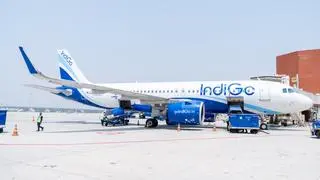Adani’s Mumbai airport spars with IndiGo, Air India over payment terms

A general view of the Chhatrapati Shivaji Maharaj International Airport in Mumbai, May 30, 2025
| Photo Credit:
FRANCIS MASCARENHAS
The airport in India’s financial capital of Mumbai, run by the Adani Group, has triggered a lobbying effort by top carriers IndiGo and Air India after it changed payment rules, citing financial needs and a risk of airline defaults, documents show.
The airport is one of India’s busiest at a time when dozens are being added in one of the world’s fastest-growing aviation markets. It is the biggest of seven managed by a group led by billionaire Gautam Adani.
Confidential letters seen by Reuters show the intense pushback to the change, which seeks a compulsory cash deposit in a bank as security against charges such as landing and parking fees, instead of a long-standing practice of bank guarantees.
“None of these airlines normally pay on time… we want to align our cash flow with the airlines’ cash flow,” said Arun Bansal, the chief executive of Adani Airport Holdings, which has a stake of 74 per cent in the airport.
“They have taken advantage of our niceness,” he added, referring to resistance to the new payment system from IndiGo and Air India since the change eight months ago in October.
Airlines often delay payments beyond a due date at month-end but the airport has to pay authorities earlier, creating working capital challenges that can be resolved by using the security deposit when needed, Bansal said.
IndiGo and Air India, which together have a share of 91 per cent of the market in India, did not respond to queries from Reuters.
A source with direct knowledge of the matter said the new policy would require the two airlines to make deposits of about $23 million, taken together. For Air India, owned by the Tata Group conglomerate, such payments could strain its finances after racking up losses of $521 million last year, in addition to monthly costs of $50 million after Pakistan closed its airspace to Indian airlines.
The Mumbai International Airport Ltd (MIAL), which serviced 53 million passengers last year, also faces financial challenges, after posting losses of $71.11 million on revenues of $461 million last year, disclosures show.
In a December 31 letter to an airlines body, the airport justified the change by pointing out its “deteriorating financial position” and “significant debt obligations”.
“The deposits will help MIAL’s financial stability and credit rating,” it added.
Default risk, Air India push
The change also aimed to protect the airport from risks such as an airline going bankrupt, as carriers Jet Airways, Go First and Kingfisher Airlines have done in the last few years, Bansal said.
The Mumbai airport has the right to cancel the slots of airlines that do not follow the new policy, but does not intend to do so in the interest of passengers, he added.
The International Air Transport Association, representing both Air India and IndiGo, wrote to India’s civil aviation ministry in December, calling the change a bid to use airline deposits to fund the airport’s need for working capital.
India’s civil aviation ministry did not respond to Reuters’ queries. The government has a stake of 26 per cent in the Mumbai airport.
In a letter on April 2, the Federation of Indian Airlines told the airport it disagreed with the contention that airline payments were not timely.
Air India has lobbied the Indian government, saying the industry was already facing “immense financial pressure” in an April 15 letter.
“It is highly likely that other airports across the country could adopt similar measures, leading to widespread financial strain,” Air India said in the letter, seen by Reuters.
More Like This

Published on May 30, 2025



